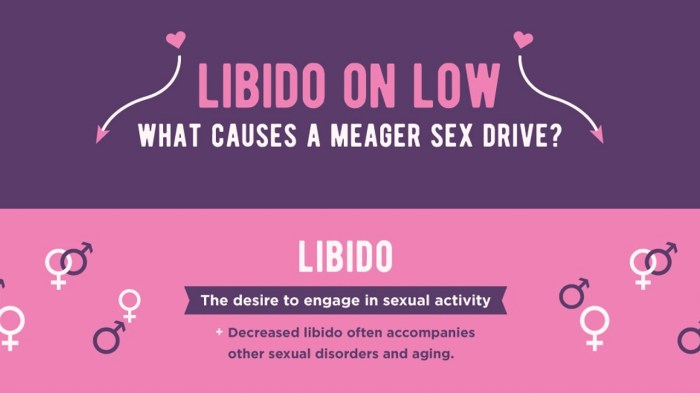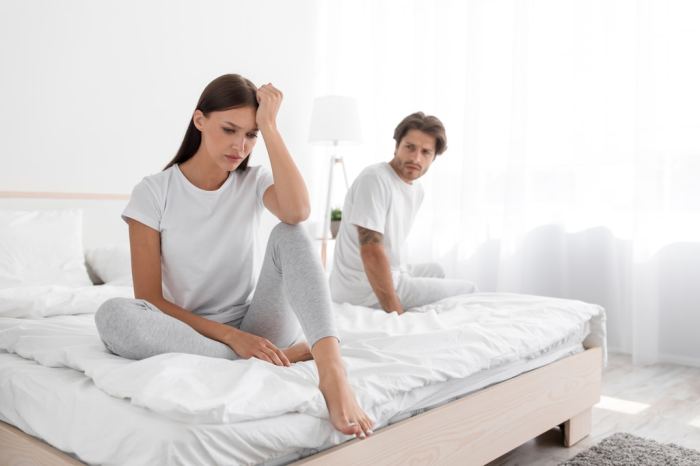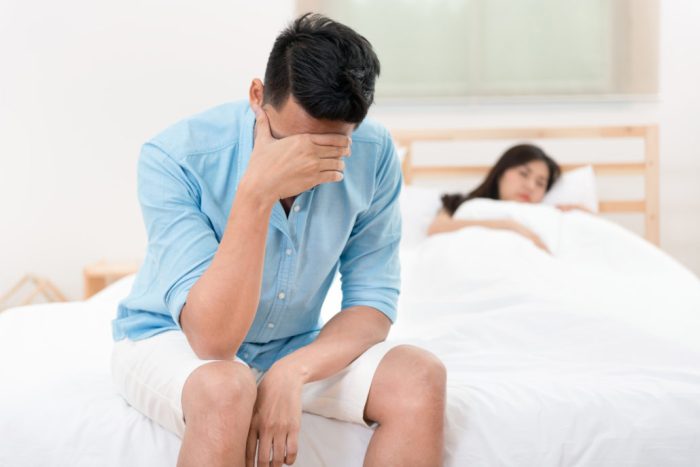Low libido, a common concern affecting individuals of all genders, can have a profound impact on relationships, self-esteem, and overall well-being. Understanding the underlying causes of low libido is crucial for addressing this issue effectively. This article delves into the multifaceted nature of low libido, exploring its physiological, psychological, and social dimensions.
By shedding light on the complexities of this condition, we aim to empower individuals with the knowledge and resources they need to regain their sexual vitality.
From hormonal imbalances to psychological factors, the causes of low libido are diverse and often interconnected. This article unravels the intricate interplay between these factors, providing a comprehensive understanding of the potential reasons behind decreased sexual desire. Whether you’re experiencing low libido or simply seeking to enhance your sexual well-being, this exploration will provide valuable insights and practical guidance.
Medical Conditions
Low libido can be a symptom of various medical conditions. Hormonal imbalances, thyroid issues, and chronic illnesses can all affect sexual desire and function.
Hormonal Imbalances
- Low levels of testosterone, estrogen, or progesterone can lead to decreased libido in both men and women.
- Conditions such as menopause, polycystic ovary syndrome (PCOS), and thyroid disorders can disrupt hormone production.
Thyroid Issues
- An underactive thyroid (hypothyroidism) can cause fatigue, weight gain, and decreased libido.
- An overactive thyroid (hyperthyroidism) can lead to increased metabolism, anxiety, and reduced libido.
Chronic Illnesses
- Conditions such as diabetes, cancer, and heart disease can affect overall health and well-being, which can impact sexual desire.
- Medications used to treat these conditions can also contribute to low libido as a side effect.
Medications
Medications can have a significant impact on libido, both positively and negatively. Some medications can increase libido, while others can decrease it. The effects of medications on libido can vary depending on the individual, the medication, and the dosage.
There are a number of different types of medications that can affect libido. These include:
- Antidepressants: Antidepressants can increase or decrease libido, depending on the type of antidepressant. Selective serotonin reuptake inhibitors (SSRIs) and serotonin-norepinephrine reuptake inhibitors (SNRIs) can often decrease libido, while bupropion and mirtazapine can increase libido.
- Antipsychotics: Antipsychotics are used to treat schizophrenia and other mental health conditions. They can block dopamine receptors in the brain, which can lead to a decrease in libido.
- Hormonal contraceptives: Hormonal contraceptives, such as birth control pills, implants, and injections, can decrease libido by reducing the levels of estrogen and progesterone in the body.
- Testosterone replacement therapy: Testosterone replacement therapy can increase libido in men who have low testosterone levels.
- Other medications: A number of other medications, such as beta-blockers, calcium channel blockers, and diuretics, can also affect libido.
Lifestyle Factors
Lifestyle factors play a significant role in maintaining a healthy libido. Various aspects of our daily lives, such as stress, sleep, diet, and alcohol consumption, can have a profound impact on our sexual desire.
Stress
Chronic stress can wreak havoc on our physical and mental well-being, including our libido. When we’re stressed, our bodies release the hormone cortisol, which can suppress the production of sex hormones like testosterone and estrogen.
Lack of Sleep
Sleep is essential for overall health, and it’s no different for our libido. When we don’t get enough sleep, our bodies produce less of the hormones that are responsible for sexual arousal.
Poor Diet
A healthy diet is essential for maintaining a healthy libido. Foods that are high in processed sugars, unhealthy fats, and caffeine can all have a negative impact on our sexual desire.
Excessive Alcohol Consumption
While moderate alcohol consumption may not have a significant impact on libido, excessive alcohol consumption can lead to decreased sexual desire and performance.
Psychological Factors
Psychological factors can significantly impact libido, influencing an individual’s sexual desire and response. These factors encompass a wide range of mental and emotional states, including depression, anxiety, relationship issues, negative body image, and self-esteem.
Depression and Anxiety
Depression and anxiety disorders are common contributors to low libido. Depression can lead to feelings of sadness, hopelessness, and a loss of interest in activities, including sexual activity. Anxiety, on the other hand, can cause excessive worry, fear, and tension, which can interfere with sexual arousal and performance.
Relationship Issues
Problems within a relationship can strain the emotional bond between partners and negatively affect sexual desire. Issues such as communication difficulties, unresolved conflicts, and lack of intimacy can all contribute to a decline in libido.
Negative Body Image and Self-Esteem
A negative body image and low self-esteem can hinder sexual desire. Individuals who feel dissatisfied with their physical appearance may be less likely to engage in sexual activity due to feelings of self-consciousness and inadequacy.
Hormonal Changes
Hormonal changes during menopause or after childbirth can also affect libido. Declining estrogen levels during menopause can lead to vaginal dryness, discomfort during intercourse, and a decrease in sexual desire. Similarly, hormonal fluctuations after childbirth can impact libido, as the body adjusts to the postpartum period.
Childhood Experiences, Trauma, and Cultural Factors
Childhood experiences, trauma, and cultural factors can shape an individual’s sexual desire. Negative childhood experiences, such as sexual abuse or neglect, can lead to feelings of shame, guilt, and avoidance of sexual activity. Cultural norms and expectations can also influence sexual desire, as they may define acceptable and unacceptable sexual behaviors.
Psychological Interventions
Psychological interventions can be effective in improving libido. These interventions may include:
- Cognitive-behavioral therapy (CBT) to address negative thoughts and beliefs about sex
- Sex therapy to improve communication and intimacy within relationships
- Mindfulness-based interventions to reduce stress and anxiety
- Medication, such as antidepressants or anti-anxiety medications, to manage underlying mental health conditions
Hormonal Changes

Hormonal fluctuations play a significant role in regulating libido, and imbalances can lead to decreased sexual desire. Pregnancy, menopause, and andropause are three key life stages where hormonal changes can have a profound impact on libido.
Pregnancy
During pregnancy, the surge in estrogen and progesterone levels can lead to an increase in libido in some women, while others may experience a decrease. Estrogen enhances blood flow to the genitals, increasing sensitivity, while progesterone can have a calming effect, reducing sexual desire.
Menopause
Menopause, the natural decline in estrogen production, often leads to a decrease in libido. Estrogen is crucial for maintaining vaginal lubrication and elasticity, and its decline can result in dryness and discomfort during intercourse, contributing to reduced sexual desire.
Andropause
Andropause, the male equivalent of menopause, involves a gradual decline in testosterone levels. Testosterone is essential for maintaining muscle mass, bone density, and libido. As testosterone levels decrease, men may experience a reduction in sexual desire and erectile function.
Hormonal imbalances can also contribute to decreased libido. For example, high levels of prolactin, a hormone that stimulates milk production, can suppress libido in both men and women. Similarly, thyroid hormone imbalances can affect libido, as the thyroid gland plays a role in regulating metabolism and energy levels.
Aging
As we age, it is natural for our libido to decline. This is due to a combination of physiological and psychological factors.Physiologically, there are several changes that can occur with age that can affect libido. These include:* Hormonal changes: As we age, our levels of sex hormones, such as testosterone and estrogen, decline.
This can lead to a decrease in sexual desire.
Decreased blood flow
Blood flow to the genitals decreases with age, which can make it more difficult to become aroused.
Reduced nerve sensitivity
The nerves that are responsible for sexual sensation become less sensitive with age, which can make it more difficult to experience pleasure from sexual activity.Psychologically, there are also several factors that can contribute to decreased libido in older adults.
These include:* Stress: Stress can take a toll on our physical and mental health, and it can also lead to a decrease in libido.
Anxiety
Anxiety can also lead to a decrease in libido, as it can make it difficult to relax and enjoy sexual activity.
Depression
Depression is a common mental health condition that can also lead to a decrease in libido.
Body image issues
As we age, our bodies change, and this can lead to body image issues. These issues can make it difficult to feel confident and attractive, which can in turn lead to a decrease in libido.The decline in libido that occurs with age can have a significant impact on sexual relationships.
It can lead to decreased satisfaction, less frequent sexual activity, and even relationship problems. However, there are several things that older adults can do to maintain intimacy and satisfaction in their sexual relationships. These include:* Talking to your partner: It is important to talk to your partner about your concerns about your libido.
This can help you to understand each other’s needs and to find ways to work together to improve your sexual relationship.
Trying new things
If you are not satisfied with your current sexual relationship, it is important to try new things. This could include trying new positions, exploring new sexual activities, or simply spending more time together.
Seeking professional help
If you are struggling to improve your sexual relationship on your own, you may want to consider seeking professional help. A therapist can help you to identify the underlying causes of your low libido and to develop strategies for improving it.
Sexual Orientation and Identity
Sexual orientation and identity refer to an individual’s enduring romantic or sexual attraction to other people. They encompass a spectrum of orientations, including heterosexuality, homosexuality, bisexuality, and asexuality. These orientations can influence an individual’s libido and sexual behavior.
Impact on Libido
The relationship between sexual orientation and libido is complex and varies among individuals. Some research suggests that individuals who identify as homosexual or bisexual may experience higher or lower libido compared to heterosexual individuals. However, these findings are not universal, and libido levels can be influenced by numerous other factors, including personal preferences, relationship dynamics, and psychological well-being.
Factors to Consider
When exploring the relationship between sexual orientation and libido, it is important to consider factors such as:
- Cultural and societal norms
- Stigma and discrimination
- Internalized beliefs and attitudes
- Access to resources and support
These factors can impact an individual’s sexual self-expression, self-esteem, and overall well-being, which can in turn affect their libido.
Communication and Openness
Open and honest communication about libido is crucial for healthy relationships. Discussing libido needs openly fosters understanding, empathy, and intimacy.
Effective Communication
Couples can communicate effectively about libido by:
- Choosing the right time and place for sensitive conversations.
- Using “I” statements to express needs without blaming the partner.
- Listening attentively to each other’s perspectives without interrupting.
- Avoiding generalizations or assumptions about the partner’s libido.
Consequences of Avoidance
Suppressing or avoiding conversations about libido can lead to:
- Misunderstandings and resentment.
- Emotional distance and intimacy issues.
- Relationship dissatisfaction and potential breakup.
Benefits of Open Communication
Research suggests that open communication about libido:
- Improves relationship satisfaction and intimacy.
- Reduces relationship conflicts related to libido.
- Promotes better sexual experiences and overall well-being.
Seeking Professional Help

Addressing low libido can be a complex process, and seeking professional help can provide valuable support and guidance. There are several types of professionals who can assist individuals with low libido, including psychologists, psychiatrists, and medical doctors.
Benefits of Professional Help
- Accurate diagnosis and identification of underlying causes
- Development of personalized treatment plans
- Access to evidence-based therapies and interventions
- Support and guidance from trained professionals
- Improved communication and understanding within relationships
Types of Professionals
- Psychologists: Provide therapy, counseling, and psychological assessments to address emotional and behavioral factors contributing to low libido.
- Psychiatrists: Medical doctors who specialize in mental health, can prescribe medications and provide therapy for underlying psychological conditions.
- Medical Doctors: Can diagnose and treat medical conditions that may affect libido, such as hormonal imbalances or chronic illnesses.
Specific Examples
- Therapy can help individuals understand and cope with emotional or psychological factors contributing to low libido, such as stress, anxiety, or relationship issues.
- Medication can be prescribed to address hormonal imbalances or other medical conditions that may be affecting libido.
- Medical consultation can provide a comprehensive evaluation of physical health and rule out any underlying medical conditions that may be impacting libido.
Natural Remedies and Supplements
Several natural remedies and supplements have been anecdotally reported to improve libido. However, it’s important to note that scientific evidence supporting their efficacy is limited. It’s crucial to consult a healthcare professional before using any supplements or remedies to address low libido.
Some natural remedies and supplements that have been associated with improved libido include:
Maca Root
- Maca root is a Peruvian plant that has been traditionally used as an aphrodisiac.
- Some studies suggest that maca root may help improve sexual function and desire in both men and women.
Ginseng
- Ginseng is a traditional Chinese herb that has been used for centuries to enhance energy and vitality.
- Some studies indicate that ginseng may improve erectile function in men.
Tribulus Terrestris
- Tribulus terrestris is an herb that has been used in traditional Ayurvedic medicine to treat sexual dysfunction.
- Some research suggests that tribulus terrestris may increase testosterone levels and improve libido.
Horny Goat Weed
- Horny goat weed is a Chinese herb that has been used to enhance sexual performance.
- It contains a compound called icariin, which may help improve blood flow to the genitals.
DHEA
- DHEA is a hormone that is produced naturally by the body.
- Some studies suggest that DHEA supplements may help improve libido in women.
Mindfulness Practices and Their Impact on Libido
Mindfulness is the practice of paying attention to the present moment without judgment. It can be incorporated into daily routines through various practices, such as meditation, yoga, or simply taking a few minutes each day to focus on your breath or body sensations.
Meditation
Meditation is a practice that involves sitting in a comfortable position and focusing on your breath or a mantra. It helps to calm the mind and body, and can increase awareness of bodily sensations and emotional triggers.
Yoga
Yoga is a mind-body practice that combines physical postures, breathing exercises, and meditation. It helps to improve flexibility, strength, and balance, and can also help to reduce stress and increase self-awareness.
Body Scan Meditation
Body scan meditation is a practice that involves lying down and slowly scanning your body from head to toe, paying attention to any sensations that arise. It helps to increase awareness of bodily sensations and can help to identify any areas of tension or discomfort.
Case Studies and Examples
Examining real-life scenarios can provide valuable insights into the multifaceted nature of low libido. These case studies illustrate the interplay of various factors and highlight the complexity of this condition.
Case studies and examples serve as valuable tools for understanding the complexities and variations in the causes of low libido. They provide a real-world perspective on the challenges individuals face and the factors that may contribute to this condition.
Case Study 1: Medical Condition Impact
A 45-year-old female presents with a sudden onset of low libido. Medical examination reveals an underlying thyroid disorder. Thyroid hormone replacement therapy effectively resolves her symptoms, demonstrating the potential impact of medical conditions on sexual desire.
Case Study 2: Medication Side Effects
A 28-year-old male experiences a decline in libido after starting a new antidepressant medication. The medication’s side effects include decreased sexual desire, highlighting the potential role of medications in influencing libido.
Case Study 3: Lifestyle Factors and Stress
A 32-year-old female with a demanding career reports a gradual decrease in libido over the past few months. Lifestyle assessment reveals chronic stress, lack of sleep, and poor nutrition. Addressing these lifestyle factors improves her libido, emphasizing the impact of stress and overall well-being on sexual desire.
Case Study 4: Psychological Factors and Trauma
A 38-year-old male has a history of childhood sexual abuse. He struggles with low libido and difficulty forming intimate relationships. Therapy focuses on addressing the psychological impact of trauma, demonstrating the connection between past experiences and current sexual functioning.
Conclusion

Addressing low libido requires a comprehensive approach that acknowledges its multifaceted nature. Healthcare providers and individuals should prioritize addressing this condition and its impact on overall well-being. Further research is crucial to advance our understanding and treatment options for low libido.
Key Points
Low libido is a prevalent issue that affects individuals of all genders, significantly impacting relationships, self-esteem, and quality of life. Its causes are multifaceted, encompassing physical, psychological, and social factors. A comprehensive approach is essential to address all potential underlying causes.
Treatment options vary depending on the underlying cause and may include medication, therapy, lifestyle changes, and alternative therapies. Healthcare providers should collaborate with individuals to develop personalized treatment plans.
Call to Action
Individuals experiencing low libido should seek professional help to determine the underlying causes and develop an appropriate treatment plan. Healthcare providers should prioritize addressing low libido and its impact on overall well-being. Further research is crucial to advance our understanding and treatment of this condition.
By working together, we can improve the lives of those affected by low libido.
Last Point
In conclusion, low libido is a complex issue that requires a holistic approach to treatment. Addressing both the physical and psychological factors that contribute to low libido is essential for restoring sexual health and well-being. By understanding the underlying causes and seeking appropriate professional help, individuals can regain their sexual vitality and improve their overall quality of life.
Further research and a greater focus on this condition are crucial to advance our understanding and develop more effective treatment options.
Q&A
What are some common physical causes of low libido?
Physical causes of low libido include hormonal imbalances, thyroid issues, chronic illnesses, and certain medications.
How can stress and lack of sleep affect libido?
Stress and lack of sleep can significantly impact libido by disrupting hormone levels and reducing overall energy and well-being.
What role does communication play in addressing low libido within relationships?
Open and honest communication about libido needs is crucial within relationships. Suppressing or avoiding conversations about libido can lead to misunderstandings and further strain on the relationship.

